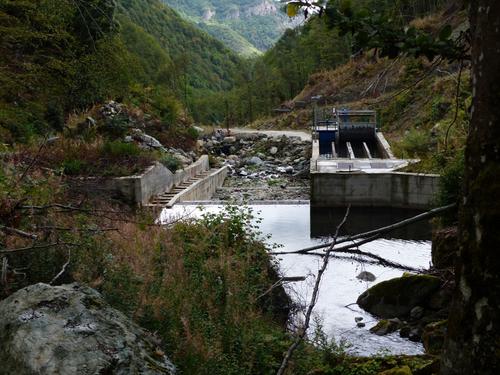European-financed small hydropower plants damaging pristine Balkan landscapes

The intake of the Tearce 97 (Bistrica 97) hydropower plant deep in the Shar Mountain nominated Emerald site.
© Andrey RalevPrague, Radolfzell, Skopje, Zagreb. Eight hydropower projects in Albania, Croatia and Macedonia financed with European public money have damaged biodiversity and are in urgent need of increased monitoring and restoration measures, finds a study by CEE Bankwatch Network released today (1).
The hydropower plants were enabled by support from the European Bank for Reconstruction and Development (EBRD) and the European Investment Bank (EIB) and were built in 2013-2015. They are affecting endemic and endangered species, and in some cases they have also hampered local communities’ water use, the new study finds. In most cases, flagrant violations of national laws and international financial institutions’ standards are visible and include blocking fish passes, releasing insufficient or no water at all downstream, and creating significant erosion with access roads. National authorities appear to have imposed fines on the hydropower plant operator in only one of the cases.
“Our research shows that so-called small hydropower plants have large impacts. It is high time for financiers to stop investing in any industrial activity in ecologically sensitive areas”, says Igor Vejnovic, Bankwatch’s hydropower policy officer and the author of the study.
”Both European Bank for Reconstruction and Development and European Investment Bank will revise their lending policies in 2018. We expect them to introduce no-go zones for financing hydropower in line with the recommendations of the International Union for Conservation of Nature (IUCN)” added biologist Ana Colovic Lesoska, from Eko-svest, Macedonia, one of the chief participants in the field research.
The study shows that it should have been reasonably obvious that projects in ecologically sensitive areas, such as national parks, would have significant impacts on wildlife. Nevertheless, the European public banks decided to proceed relying on environmental impact studies of dubious quality that had played down potential effects. As a result, these projects have caused the destruction of habitat of the endemic Prespa Trout in Macedonia and the filling of the glacial Black Lake in Albania with sediment, among other impacts. All this could have been prevented by excluding financing for projects in protected areas. The situation has been aggravated by governments’ inability or unwillingness to properly monitor and enforce legislation.
In three of the cases - Lipkovo (aka Kamena reka), Tearce 97-99 (aka Bistrica 97-99) and Ilovac - the sources of financing remained secret until recently. They were not directly financed by the European public banks, but through loans extended via local banks, which refuse to reveal which projects they finance.
“In the Mavrovo National Park in Macedonia alone, 15 more plants are planned. Given the impacts the Tresonecka hydropower plant is already having, plans for additional ones must be abandoned,” says Theresa Schiller from the EuroNatur Foundation.
“The EBRD and EIB’s money is still public money even when channelled through commercial banks. Yet the names of such projects are not disclosed by the banks and the public is denied the chance to influence their decision-making. Three cases covered by the study show what kind of impacts even small projects can have and that greater scrutiny is needed,” says Pippa Gallop, Bankwatch’s Research Coordinator.
Background Information
(1) The research covered the following hydropower plants
● Rapuni 1-2, Albania. Owner: C & S Construction Energy shpk (Albania), financed by the EBRD
● Ternove, Albania. Owner: Teodori 2003 shpk (Albania/Canada), financed by the EBRD
● Ilovac, Croatia. Owner: Tekonet d.o.o (Croatia), financed by the EIB
● Brajcinska reka 1 (also: Brajcino 1), Macedonia. Owner: Mali hidroelektrani DOO (Macedonia), financed by the EBRD
● Brajcinska reka 2 (also: Brajcino 2), Macedonia. Owner: PCC HYDRO DOOEL (Germany), financed by the EBRD/KfW
● Tresonecka reka (also Tresonce), Macedonia. Owner: Hidro Enerdzi Group (Macedonia), financed by the EBRD
● Lipkovo (also: Kamena reka), Macedonia. Owner: SOL Hidropauer DOOEL (Italy), financed by the EIB
● Tearce 97-99 (also: Bistrica 97-99), Macedonia. Owner: SOL Hidropauer DOOEL (Italy), financed by the EIB
The study can be found here.
It was produced as part of the campaign “Save the Blue Heart of Europe”.
Save the Blue Heart of Europe campaign:
About 2800 new dams are currently projected between Slovenia and Albania. In order to counteract this spate of destruction, ‘EuroNatur’ and ‘RiverWatch’ have launched the “Save the Blue Heart of Europe” campaign in cooperation with local partners in the respective Balkan countries. Find out more here: https://www.balkanrivers.net
Contact:
Anja Arning, EuroNatur, anja.arning(at)euronatur.org, +49 7732 9272 13
Igor Vejnovic, Bankwatch, igor.vejnovic@bankwatch.org, +420 773 140 691
Ana Colovic Lesoska, Eko-svest, ana@bankwatch.org, +389 72 726 104


